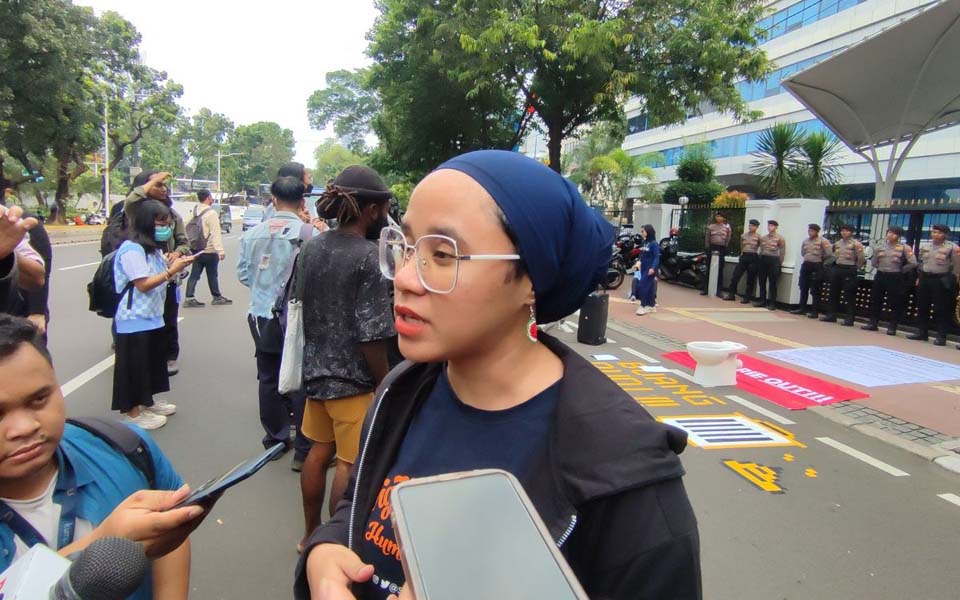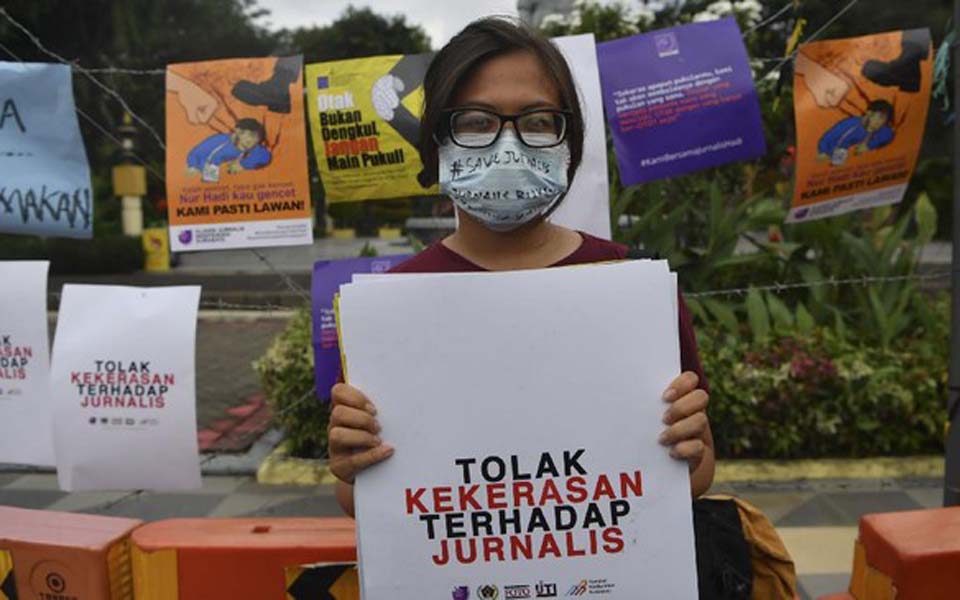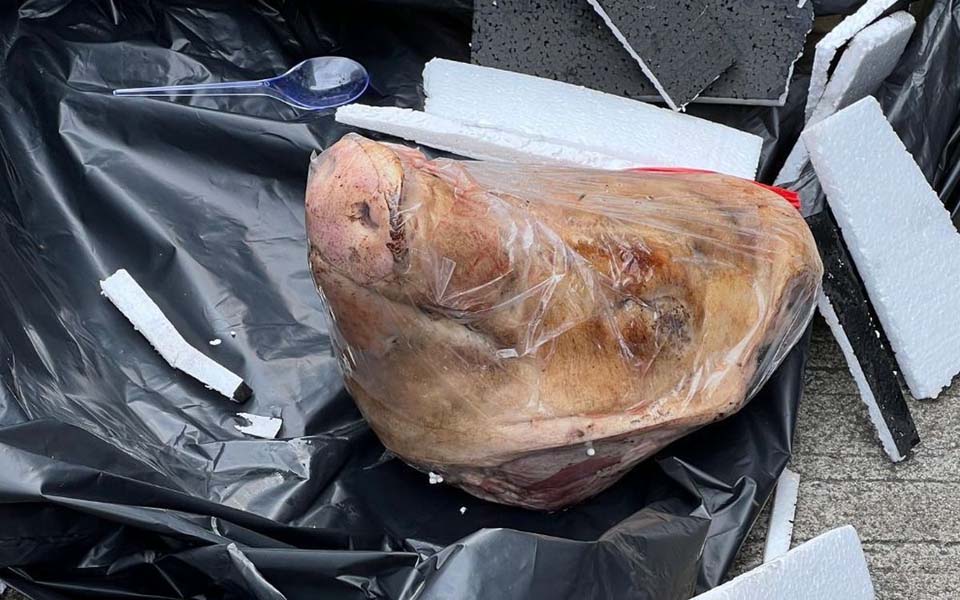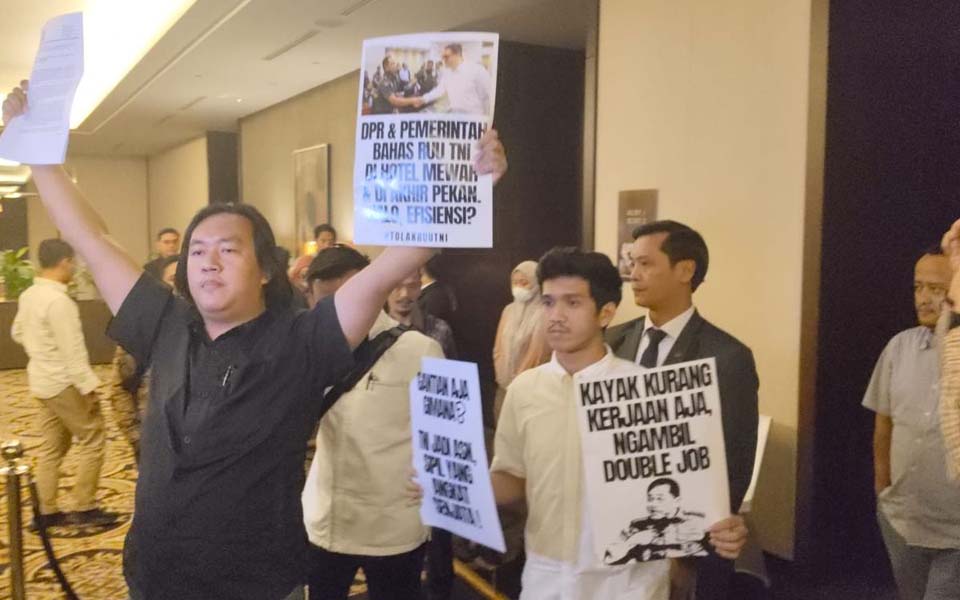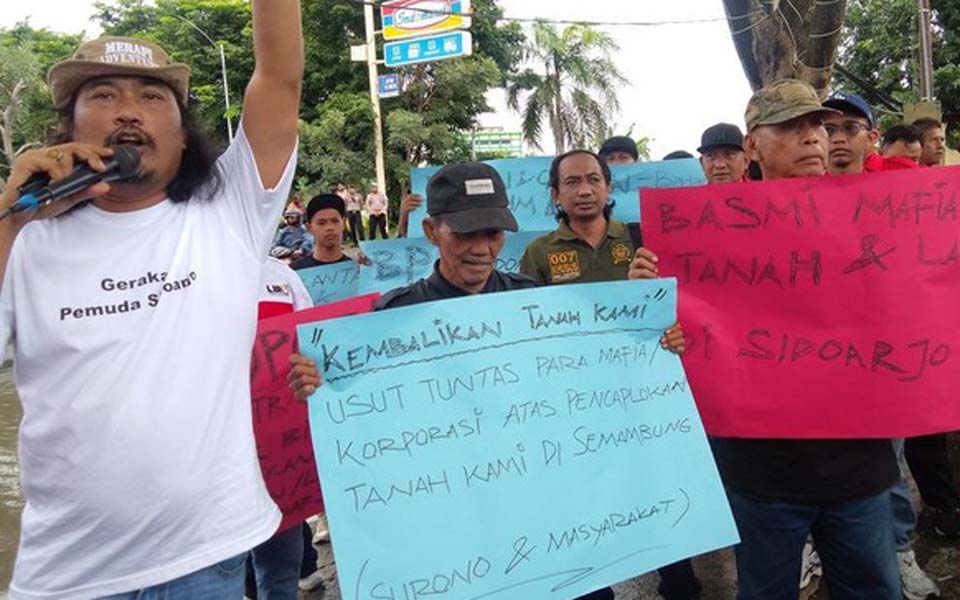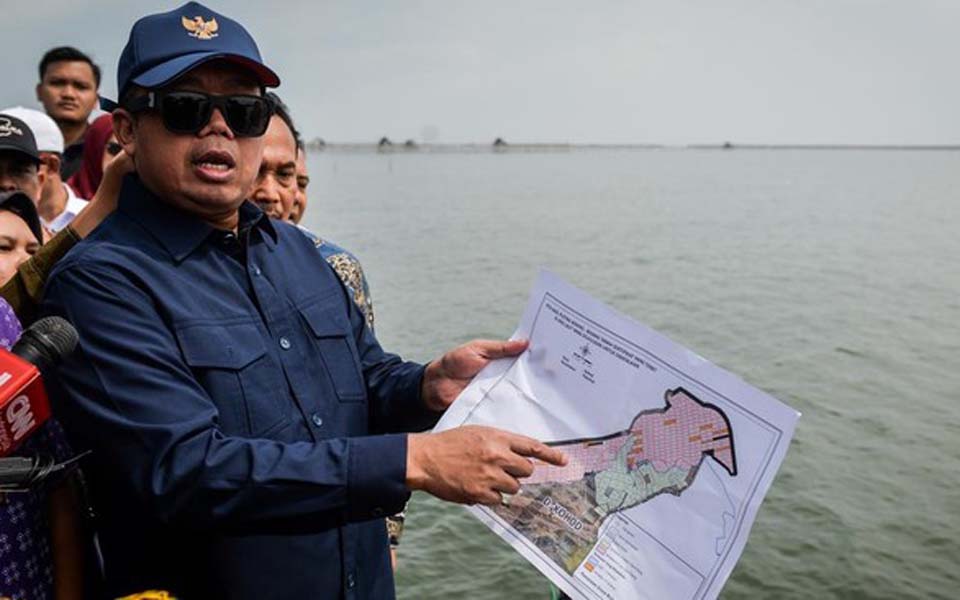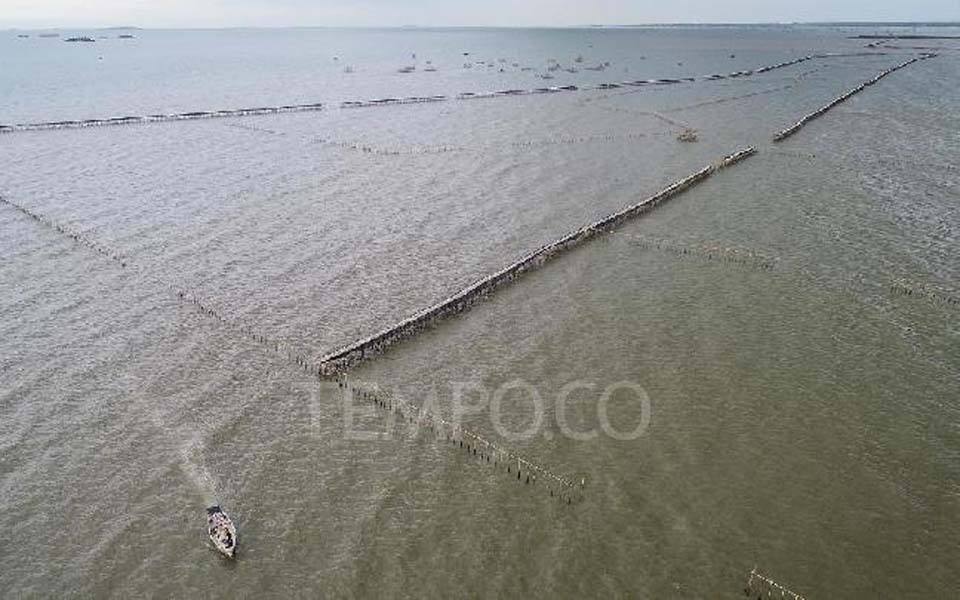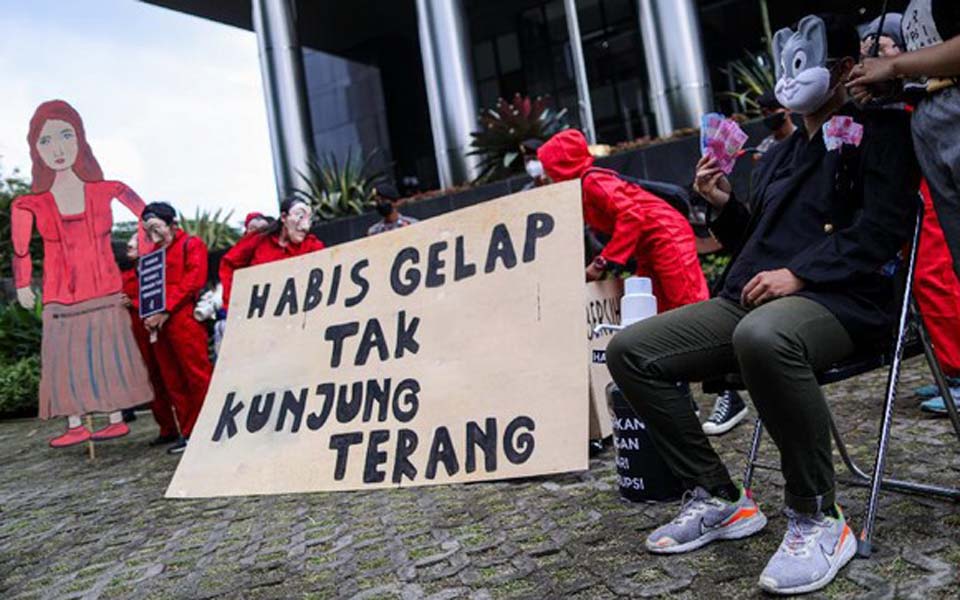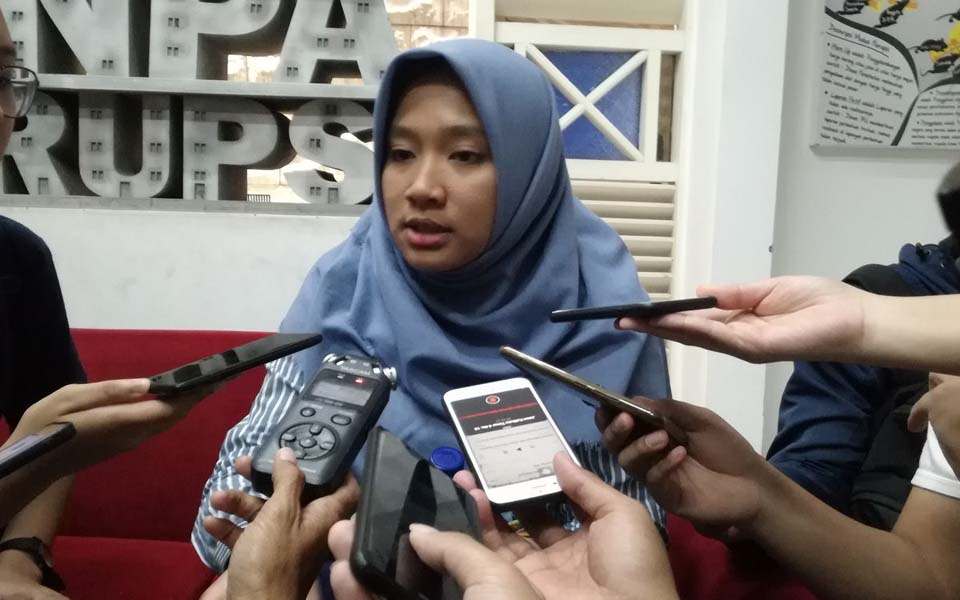Hendra Friana – “I was handcuffed and forced into a vehicle, and all before being shown an arrest warrant”.
22-year-old Muhammad Hisbun Payu related this story to Tirto by phone from the Central Java police headquarters (Mapolda) on Monday March 5.
Is, as he is know by his friends, is a student activist from the leftist Student Struggle Center for National Liberation (Pembebasan) who has been protesting against the PT Rayon Utama Makmur (RUM) factory in Sukoharjo, Central Java.
Since October last year, Is, along with hundreds of local people, have been calling on the Sukoharjo regency government (Pamkab) to revoke PT RUM’s environmental permit because it has been emitting a foul smelling waste which has inundated villages in the vicinity.
Is was arrested on Sunday evening, March 4, as he was about to buy cigarettes from an Alfamidi minimarket near his place of residence in the Lenteng Agung area of South Jakarta.
Is had arrived in Jakarta that day with the intention of reporting the problems faced by people around the factory to the National Human Rights Commission (Komnas HAM).
He had already gathered together a pile of documents ranging from the results of an independent investigation to reports of intimidation by security personnel against local residents. He was taken into custody however before he could reach Komnas HAM.
Syahrul Yakub, a friend who accompanied Is when he was buying the cigarettes, tried to stop the eight police officers from arresting him but in vein. He then returned to his boarding house and related what had happened to his friends.
A short time later, five police officers brought Is to the boarding house to collect his things. When his friends asked to be allowed to accompany him the police refused.
From Jakarta he was taken to the Central Java provincial capital of Semarang in a black Suzuki car. “In the car [taking me] there were four police officers. In another car, a black Honda Civic if I’m not mistaken, there were four other police officers”, he said.
When contacted at 9am, the police transporting Is told Tirto that they were approaching Semarang and he would soon be questioned at the Central Java police headquarters.
Ivan Wagner, a legal defender from the Semarang Legal Aid Foundation (LBH) said that as of Monday evening, police had still not questioned Is.
Criminalised for his activism
His arrest began with a chaotic protest by local residents in front of the PT RUM factory which ended in a security post being burnt down on February 23. Residents also blockaded the factory and set fire to tyres because they were angry with Sukoharjo Regent Wardoyo Wijaya.
Local people had already held protests in front of the factory on October 26 and November 30 last year. On January 19 they held a demonstration at the Sukoharjo Regional House of Representatives (DPRD).
About a month later on February 22, another action was held at the Sukoharjo regent’s office. The protesters were angered because the regent had failed to issue a letter ordering the factory to halt operations and instead read out a joint statement by PT RUM and the Sukoharjo Regional Consultative Council (Muspida).
Despite this, said Is, residents urged Wardoyo Wijaya to issue an order halting the factory’s operations totally or temporarily and revoke its environmental permit. The response to this was a pledge that the order would be issued on February 23 after constitution by the Sukoharjo regency government.
Residents then took a decision to sleep over in front of the factory while they waited for the order to be issued. On the promised day however, the order had still not been signed and Wijaya instead departed to attend a national working meeting of the ruling Indonesian Democratic Party of Struggle (PDI-P) in Bali.
“Now, it was this that in the end made residents in front of the factory so disappointed. They were angry, and spontaneously vandalised [the factory]”, said Is.
The Muhammadiyah University student denies that he provoked residents into doing this. He says that he only arrived at the location at around 2pm, long after the chaos had erupted in front of the factory.
“When I arrived the factory was already damaged, all kinds of blockades had been setup. The factory’s security post had been torched, I don’t know who set fire to it”, he said.
He was in fact intending to report the police officers who had acted violently during the resident’s protest in front of the factory. “We recorded it, one of our friends was kicked by police”, said Is.
In addition to Is, two other local residents who police allege were involved in the vandalism are als being detained at the Central Java Mapolda.
Sutarno Ari Suwarno, a lawyer from the Sukoharjo Social Forum for Environmental Concern (FMPL) said that one of the two is a resident of Jumapolo, Karanganyar sub-district, and the second a resident of the Plesan Village, Nguter sub-district. They have been charged under Article 170 Paragraph 1 and Article 187 Paragraphs 1 and 2 of the Criminal Code (KUHP).
Suwarno also said that the resident’s vandalism and torching of the security post on February 23 was spontaneous and un-coordinated.
“It was a spontaneous act by local residents. The way it was, was at the time me and several representatives were summoned by intelkam [intelligence and security]. We were discussing the issue of the order to halt factory operations”, he said.
After the order to halt operations was finished, said Suwarno, “Me and several friends went back to the residents and told them that the order has been signed. The date was signed. Only after that did the resident’s anger subside”.
Foul smell, illness
Suwarno explained that the air pollution as a result of waste from the PT MUR factory had been a problem since the factory began operations in October last year.
Since then residents had protested continuously to the regional government and called for an audit of the waste being produced by the synthetic cotton processing plant.
“We had repeated audiences, we went to the Environmental Office, even to the Presidential Staff Office (KSP). In January the KSP sent a team there which declared that PT MUR had committed violations”, he said.
Three days later, a 10-month-old baby named Arbani Shakeel Alfatih in Dukuh Jayan, Celep Village, Nguter, died as a result of the air pollution. “Ever since they were born they did indeed have lung problems, but because of the air pollution it become chronic and they eventually died”, said Suwarno.
In mid-February, the Sukoharjo Muhammadiyah PKU Hospital conducted a health check on pollution in the Gedonginong village. “The results were that the waste was above the allowed limit and the most of the sick were suffering from acute respiratory infections (ISPA). There were 35 people with severe ISPA and more than one hundred with mild ISPA”, he said.
The results of an analysis by a Muhammadiyah independent investigative team obtained by Tirto showed that two out of three parameters for liquid waste from PT RUM exceeded the allowed limit, namely Total Dissolved Solids (TDS) and Chemical Oxygen Demand (COD). One other parameter which was below the allowed limit was the liquid waste PH.
The head of the independent team, Wiwoho Aji Santoso, said that the research results were forwarded to the Sukoharjo DPRD on February 19. Since then however, there has been no concrete action taken by the government to halt the factory’s operations. “We forwarded all of the research results to the DPRD, in detail”, he said.
Government response
Sukoharjo regency Environmental Office chief Djoko Sutarto said that the government has issued administrative sanctions against the factory ordering a temporary halt to operations.
“Not closed down. If it was closed down there wouldn’t be any activities. Yes, just production”, he told Tirto.
PT RUM has been ordered to address three conditions if it wants to resume operations including conducting continuous emission monitoring, controlling the emissions causing the foul smell and resolving the liquid waste entering the Bengawan Solo river.
“We have given them a time frame of 18 months at the latest. But if it’s resolved in two months, they can start operations again”, he said.
Sutarto that on February 22 the PT RUM management genuinely tried to resolve the waste problem without an order from the regent but residents were dissatisfied and asked for the factory to be closed down.
“I can’t be closed down. Later if they can’t fulfill the requirements there will be more sanctions. It can’t just be closed down immediately. There are legislative stipulations right”, he said.
He also refuted the findings of the Muhammadiyah investigation team on waste levels saying that the foul smell from the factory waste was not why hundreds of local residents are suffering ISPA.
[Slightly abridged translation by James Balowski. The original title of the report was Kisah Is, Dikriminalisasi karena Melawan Pabrik Kapas Sintetis.]
Source: https://tirto.id/kisah-is-dikriminalisasi-karena-melawan-pabrik-kapas-sintetis-cFHX






